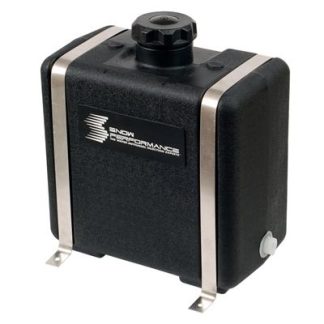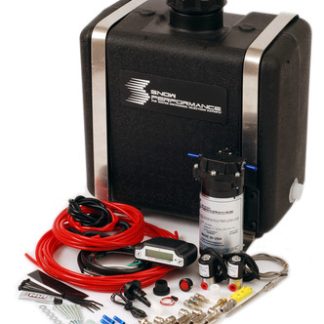Description
New from Snow Performance is the only system proven to increase fuel economy in all load states – empty or while towing. Special mapping and the most sophisticated 2d digital controller available result in 1-3 MPG increases! The MPG-MAX™ system does not require a sustained high load state in order to provide maximum fuel economy gains. The MPG-MAX™ system uses a new injection management controller that allows for a small, steady spray of water/methanol to be injected across the entire power curve – even while in cruise. This provides an increase in combustion efficiency which provides more power without injecting more diesel fuel. This increase in efficiency translates into an increase in fuel economy. Typical fuel economy increases are 10%-15% or 1-3 MPG.
The MPG-MAX™ system has a secondary output that is used to activate a Power Mode. The more sophisticated microprocessor introduces a independently mapped second stage of injection. Larger nozzles are used to inject more fluid to make more power. The Power Mode activation point is adjustable for best performance. The net effect is smooth power in all engine load states with no combustion quench resulting in a true turn-on-and-forget system.
It also now has a brighter LCD screen that displays boost, EGTs, and injection pump output. This means a savings of $200-$300 in gauges you don’t have to buy.
• Will not adversely affect particulate matter filter like most other power adders
• Doesn’t leave a “signature” on vehicles computer so warranty isn’t jeopardized
• Comes complete with large 7 gal. reservoir for a truly complete system
• The most advanced system on the market – true 2d mapping and 2 nozzles controlled independently for smooth power – always
• The only system proven to improve fuel economy
• Provides better fuel economy (1-3 MPG), more power (70-100 HP), and lower EGTs (200-300 degress)
• Dash mounted module – displays real time – no need for gauges
“No-Hassle” Lifetime Limited Warranty!
1. What are the benefits of Water/Methanol injection?
Boost Cooler Benefits (Diesel):
1. Greatly reduced EGT’s. Decreases of 250 degrees F are common using a 50/50% Methanol /Water mix. This prevents the usual problems associated with high exhaust car temperatures – rings sticking, holed pistons, etc.
2. Low cost power – where else can you get 70-100 HP for approximately $400 along with reduced EGT’s.
3. Greatly increased air charge densities – 3-5 psig boost increases are common.
4. Great for towing – more power/cooler EGT’s to haul the heaviest loads.
2. Do I need an Intercooler with Water/Methanol injection?
Up to approximately 20 psi boost, water/methanol injection will provide all the density increase/detonation control needed in most applications. Of course, Intercooling and water/methanol injection would provide even greater benefits especially beyond 20 psi boost. Most air-to-air intercoolers are only 50-65% efficient. That means for example, that with 11psi boost and its 120f air charge temperature increase, an intercooler reduces the air charge temperature only 60 degrees. Also, an intercooler will reduce boost 2 – 4 psi. on average.
3. Why not use a windshield washer pump?
Water/Methanol must be injected at above 50psi to properly atomize. Lower than 50psi causes greatly reduced air charge cooling as the result of larger droplets and their reduced total surface area.
4. Why methanol?
Methanol is a high octane fuel that is extremely resistant to detonation with an excellent cost/benefit ratio. ($1.50 – $2.00 per gallon.) Its high latent heat of vaporization also makes it an excellent air charge cooler which means a denser mixture and more horsepower. Because of these facts, it is a better anti-detonant than ethanol or iso-propanol although they will work in a pinch. It has however only about 60% of the energy content of gasoline by volume so about twice as much is used to make similar power if used as a straight fuel. It is extremely toxic and should be handled with rubber gloves in well ventilated areas only. Care should be taken to avoid skin contact.
5. How much Water/Methanol?
To prevent detonation, the ratio of Water/Methanol to gasoline is roughly 1 to 5 in gasoline applications- 1 to 4 in diesel. In practice, you give it as much water / methanol as it takes to eliminate detonation without quenching combustion. The amount depends on the onset RPM of injection, the octane of the gasoline, fuel/air ratio, cylinder head type, even the weather conditions. Your engine is actually pretty tolerant of extra water vapor, you will know it’s too much when the engine misses and loses power.
6. Where can I purchase Methanol?
Methanol can generally be purchased where racing fuels are sold. Also, most gas line dryers like “Heat” are simply Methanol. Suppliers of industrial chemicals can also supply Methanol usually at a higher price than fuel suppliers. If all else fails, most windshield washer fluids are up to 40% Methanol and 58% water. Methanol can be purchased on the web at www.worldwideracingfuels.com and hiperfuels.com.
7. How long will a tank (2 qts.) last?
In high boost/high horsepower application, a full blast 1/4 mile run will utilize as much as 1/8 tank. A larger tank should be considered if over 9psi boost is utilized in road racing where a tank can be used in as few as 6 – 2 mile/ full tilt laps. Under normal street use in a 400 HP Mustang, a tank usually lasts about 500 miles. Two reservoirs can be used for 1-gal total capacity if desired. Turbo diesels use more qty. and usually utilize the existing windshield washer reservoir (over 4 qts. in most cases) or the new 8-gal reservoir upgrade. More will always be used when the system is first installed, less when the novelty wears off.
8. Can I use windshield washer fluid?
Although most contain some glycol and detergent, most windshield washer fluids are up to 50% alcohol (methanol, ethanol, isopropanol) and make an excellent Boost Cooler®. Try to find one that indicates “contains methanol”.
9. At what boost level do I introduce Water/Methanol?
Centrifugal superchargers/large turbos: Generally, at 50% of peak boost the recommended quantity should be introduced. Positive displacement superchargers/ fast spooling turbos: injection should occur at or near peak boost to avoid combustion quench since peak boost occurs so fast.
10. What ratio of Water/Methanol is recommended?
A 50/50 ratio is recommended. This has been demonstrated to be the best for charge/air cooling, excellent detonation control, and controlling cylinder temperature. This includes diesel applications where water conditions the combustion of the methanol so combustion timing isn’t affected.
11. Many recommend Denso Iridium spark plugs in boosted applications. Will these work also with water/methanol injection?
Denso Iridium spark plugs are highly recommended with the Boost Cooler®. Iridiums, with their low firing thresholds and intense spark, allow for larger quantities to be injected sooner without misfiring. This allows for more cooling of the intake air. If you have a misfiring problem, nine times out of ten, Iridiums will clear it up.
12. Will water/methanol harm my engine?
In theory, at recommended quantities, most of the mixture is evaporated before it hits the combustion chamber. Also, injection only takes place at high boost levels minimizing cylinder wash concerns. Engines that have been torn down after two years of water/methanol usage have shown no wear issues only clean combustion chambers. In fact, water/methanol reduces the probability of engine destroying detonation. Think of it as an insurance policy against detonation.
13. Can the Boost Cooler® be applied to naturally aspirated and nitrous engines?
1.Naturally aspirated/high compression engines:
In this application, water/methanol injection allows the use of pump fuel in all but the most extreme situations which effects tremendous cost savings as well as horsepower increases due to air density increase and realized timing potential. The system is activated by a throttle switch so that injection takes place only during high engine loads when needed.
2. NOS engines: With NOS, water/methanol injection allows the use of full timing even with large (250HP+) quantities. Injection is controlled by the same means that controls NOS injection.
3. Naturally aspirated/stock compression: With naturally aspirated engines with less than 10:1 compression, water/methanol is used typically in warm climates to get the intake temps back to 60°f. Benefits include: 10-15 HP increases from air density increases and full timing, Increased gas mileage, and carbon free combustion chambers. Activation is by a throttle switch adjusted for onset engine load. With this application, the nozzle is sized so that no more than 10% of total fuel consumption at peak flywheel HP is injected.
14. Why is Water/Methanol injection so effective on Diesels?
Unlike gasoline engines, the power in a turbo diesel is largely a function of fuel. The problem with continually adding fuel is that you reach a point where the exhaust gas temperatures become prohibitive (over 1500 degrees F). A 50/50% Methanol/Water mix will decrease EGT’s approximately 250f + while increasing power 70-100HP.
Power is increased through:
a. Intake charge cooling – Water/methanol will lower air charge temps over 200f in this application.
b. Methanol – this acts as a fuel as well as cooling the intake charge.Where else can you get this kind of power with cooler EGT’s!
15. Is this technology new with Turbo Diesel?
Water/methanol injection has been used extensively for years in high performance truck/tractor pullers. With the elevated boost levels required for peak power, water/methanol is a common means of cooling the intake charge and reducing exhaust gas temps. Also, truckers have used water injection for years to increase fuel mileage




